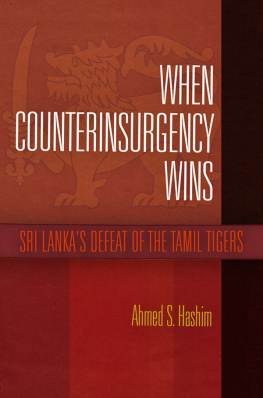BAD
STRATEGIES
How Major Powers Fail
in Counterinsurgency
JAMES S. CORUM
Author of Fighting the War on Terror
Foreword by Dennis Showalter
Professor of History, Colorado College

CONTENTS
FOREWORD
by Dennis Showalter
MILITARY WRITING CAN BE APHORISTICALLY described as an enduring dialogue between Whigs and Calvinists. The Whigs interpret warmaking as a contest between progress and obscurantism, with progresswhether represented by technology, doctrine, or reformemerging triumphant. The Calvinists interpret victory and defeat as judgments on the militarily righteous. The generals, armies, and societies following the straight and narrow path attain victory. The purblind and the contumacious are cast into darkness.
In this volume James Corum firmly aligns with the Calvinists. Bad Strategies is a presentation of compound catastrophe. In four scathing case studies it describes the failure of modern democracies in a particular form of asymmetric war. The French in Algeria, the British in Cyprus, the United States in Vietnam and again in Iraq, suffered disaster in counterinsurgencies.
At first glance the chosen case studies appear to resemble not merely apples and oranges but the entire contents of a fruit stand. A case can be made that the examples are so fundamentally different that while they may be juxtaposed, they defy comparison. France was seeking to maintain what its government, its political system, its military, and its public regarded as not an imperial but an organic connection. Algeria was understood as part of France, legally and viscerally. As a point of comparison, one might consider contemporary reactions in the United States to the immediate prospect of the southwest becoming part of a Republica del Norte. Cyprus, on the other hand, was a classic imperial outpost. Lacking the emotional connotations of India, Singapore, or even Kenya, its perceived value was entirely strategic. The United States entered Vietnam as the ally of a sovereign state threatened by internal subversion and external aggression. Iraq developed in the intellectual context of a war of liberation on the classic World War II model from the Philippines to the Netherlands: destroy the oppressor and allow people to resume normal life.
What might be called the situational awareness of the counterinsurgent powers differed no less fundamentally. French consciousness of Algeria was specific and ran wide and deep, however questionable its accuracy in specific areas. Cyprus was a generic British possession, controlled and administered by the book, not worth the bother of systematic study. American ignorance of both Vietnam and Iraq is best described as comprehensive and spectacular. Different matrices of understanding generated correspondingly different responses, but a common outcomean outcome Corum presents as predictable, yet avertable.
Corum pulls his discrete examples together under the rubricthe umbrellaof strategy. What makes this work valuable, arguably uniquely valuable, is its complex, sophisticated conceptualization of that concept. Most analyses describe strategy as a balance between ends and means. For Corum it is a synergy among ends, means, and will. The concept of will is usually included under means. In fact it is essentially different, particularly in the great democracies presented here. In any conflict, a democracys policy, strategy, and (increasingly) its tacticspolitical and militarymust be generally supported by the public, the publics representatives, and (increasingly as well) by a public media self-defined as a literal fourth estate: guardian and ombudsman for people and societies otherwise susceptible to deception and manipulation.
Of strategys three elements, will is the most salient in counterinsurgency. Here the juxtaposition of ends and means is shaped by the significant imbalance of material power between the combatants. This is particularly true for Corums cases. At the military level the British in Cyprus were far more victims of their own bungling than of inadequacies generated by the overall decline of British power. The success of French armed forces in breaking the military back of the FLN in Algeria is generally acknowledged. So is American ability to turn North Vietnam into a parking lotor, less drastically, to create Lake Hanoi by demolishing the Red Rivers dams and dykes. The forces committed to Iraq were indicted from the beginning by military specialists as inadequate, and Corum acerbically depicts the result: coping on the fly with contingencies that too often became emergencies. The ultimate capacity of the United States to increase exponentially its ground strength was nevertheless unquestionable. The numbers deployed have reflected particular decisionsand the political and public will behind them.
Will is additionally significant in shaping this work because the studied counterinsurgencies did not present a mortal threat or a fundamental challenge to the democracies conducting them. Alternative case studies come readily to mind: the struggle for South Korea from 1948 to 1950, the Hukbalahap insurgency in the Philippine Republic during the 1950s, and, not least, Israels continuing Second Intifada. Each of these situations features stark alternatives and uncompromising adversaries. In each of Corums cases the counterinsurgents had working room. The Greek Cypriots wanted no more than for the British to go away, and even that finally involved restricting their presence to mutually acceptable base areas. The Algerian rebels early demands emphasized changing status rather than severing bonds. They were correspondingly susceptible to negotiation, and a major specific strength of this work is Corums demonstration of the French militarys initial recognition of that prospect. In Vietnam, the United States eventually committed itself to a replication of Japans strategy in World War II: waging an essentially limited war against an adversary committed to total victory. That commitment nevertheless remained incremental, the situation remained a boil rather than a cancer. Corum describes the originally projected endstate of an independent noncommunist South Vietnam as neither impossible nor unrealistic. A cottage industry of academic, political, and military publication remains devoted to turning points unturned and roads not taken. In contrast to Vietnam, the Iraq counterinsurgency ultimately grew from a single decision: go or no-go. What began as a military-political blitzkrieg built on the concept of a light footprint has evolvedor devolved, or collapsed, depending upon perspectiveinto grassroots, hands-on involvement in a culture war waged in the context of a religious reformation. At every stage, however, American participation has depended on American will.
Whether in historic or contemporary contexts, will is a product of three factors: time, stress, and visibility. Time is usually considered the most obvious. George C. Marshalls famous aphorism that democracies cannot fight a Seven Years War became a mantra during the Vietnam years. It has surfaced again in the context of Iraq. It has three usual implications. First, public fortitude weakens and public attention diminishes in proportion to the duration of hostilities. The presumed consequences are best expressed by iconic movie character John Rambo: do we get to win this time? The second prospect depicts a populist











